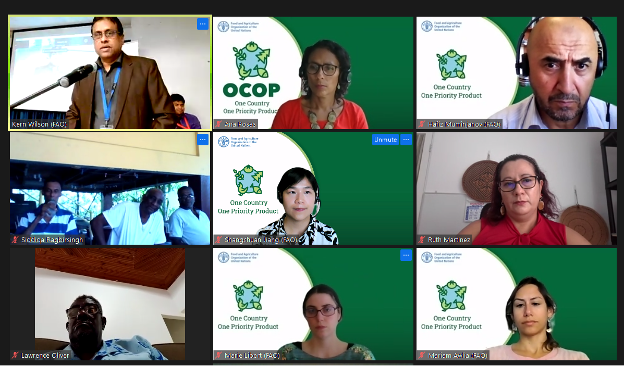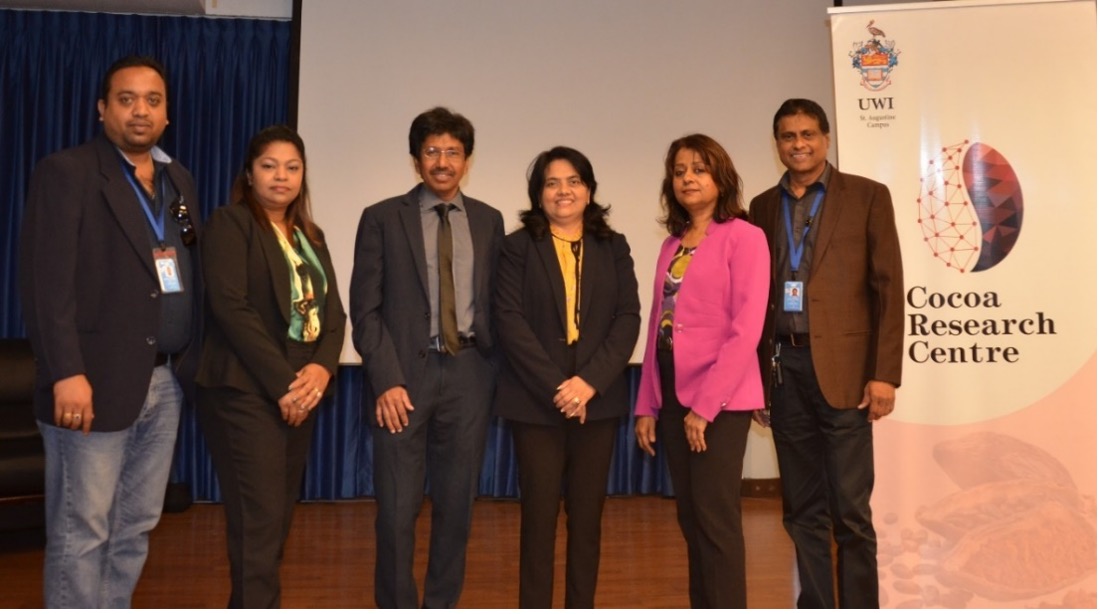News
Trinidad and Tobago workshop sets out project to invigorate their cocoa sector

St. Augustine - the Government of Trinidad and Tobago has selected cocoa as its Special Agricultural Product (SAP) to be developed with support from the FAO OCOP Initiative. This Inception Workshop for the implementation of OCOP initiative at the country level was held today to address the key challenges in the national cocoa sector, including the predominantly small-sized farms (5-10 ha in size), with below-average productivity of 150-200 kg/ha, the aging tree stock, poor management, and overall lack of investment. These factors continue to threaten the cocoa sector economic sustainability, aggravated by climate change. Also, cocoa is grown widely on hillsides, exposed to erosion, climate change impacts or deforestation.
Once the economic pillar of the Trinidad and Tobago economy, nowadays cocoa contributes less than 1% of GDP. Despite its relatively small volumes, the country has built a good reputation as being a producer of high-quality cocoa beans that are sold at a premium price in the global market. Trinidad and Tobago is proud to be recognized as one of eight 100% certified fine or flavour countries by the International Cocoa Organization (ICCO) and is rightfully the birthplace of the Trinitarian cocoa variety, which is one of the most sought after premium fine or flavour varieties.
For that reason, Trinidad and Tobago was chosen as one of the five OCOP demonstration countries, representing the Latin America and Caribbean (RLC) region. This workshop was facilitated by Suresh Sookbir, Programme Manager and the FAO Country Office OCOP Focal Point. The event took place in a hybrid mode and attended by over 80 participants from the Government of Trinidad and Tobago, the FAO Country Office, national agricultural institutions, cocoa producers and stakeholders in-person as well as the FAO Regional Office for RLC, FAO Headquarters and the OCOP Secretariat virtually. Reuben Robertson, FAO Representative for Trinidad and Tobago and Suriname delivered opening remarks, underlining that building a sustainable foundation for the cocoa industry in all the value chain links is critical for maintaining market position, mitigating reputational risk and for attracting foreign direct investment into the cocoa sector.

Members of the OCOP Secretariat, Hafiz Muminjanov, FAO Technical Adviser, and Shangchuan Jiang, FAO Project Manager, shared key elements of Global Action on the OCOP initiative, while highlighting the FAO Flexible Multi-Partner Mechanism project objectives and activities for Trinidad and Tobago, respectively. Next, the Regional Organization Plan on the implementation of OCOP in Latin America and the Caribbean was presented by Ms. Ana Posas Guevara, Agricultural Officer, FAO Regional Office for Latin America and the Caribbean (FAO RLC).
The Deputy Permanent Secretary of the Ministry of Agriculture, Land and Fisheries, Nela Dwarika-Ali delivered a keynote address, followed by a presentation by Pathmanathan Umaharan, Director, Cocoa Research Centre on the OCOP Project in Trinidad and Tobago – Purpose, Objectives, and Activities. The enormous opportunities that can be harnessed through productivity improvement, value addition and cross sector linkages through the OCOP were shared, and as the government of Trinidad and Tobago has prioritized the cocoa industry, it will act as an important cog in its economic diversification strategy.
Moreover, Mala Partap, CEO, Cocoa Development Company of Trinidad and Tobago shared the outcomes of discussions held with stakeholders. High-level government official members from the Ministry of Agriculture, Land and Fisheries of Trinidad and Tobago, senior decision makers, technical experts and value chain specialists, private sectors, farmer representatives and other key stakeholders all showed their strong support for the implementation of OCOP in Trinidad and Tobago throughout the workshop, providing positive feedback and identifying key entry points for the demands on promoting innovative technologies to support the sustainable development of cocoa value chain along with developing the enablers and establishing public-private partnerships. In addition, colleagues from FAO Food Systems and Food Safety Division (ESF) and Office of Small Island Developing States (SIDS), Least Developed Countries and Landlocked Developing Countries (OSL) were invited for the further discussion and collaboration.
Finally, Ms. Albada Beekham, Director, Research, Ministry of Agriculture, Land and Fisheries and the Government OCOP Focal Point, provided the closing remarks and reiterated that although Trinidad and Tobago is a relatively small cocoa producer, the fine or flavour cocoa that is being exported is of niche and ultraniche quality, with its unique, high-value, specialty market segment as well as the exceptionally high-value, artisanal cocoa that is unique small market segment and only accessed by micro-batch chocolatiers. Moreover, the impact of OCOP will be on strengthening food security, improving daily balanced diets, and increasing the income of smallholders and family farmers in Trinidad and Tobago, which will be achieved through the development of sustainable, productive, resilient, and competitive value chains of cocoa.

Key partners at the OCOP Inception Workshop, (L-R) NAYLAN DWARIKA, FAOTT Communication Officer; MALA PARTAP, CEO – Cocoa Development Company of Trinidad and Tobago; PROFESSOR PATHAMANATHAN UMAHARAN, Director – Cocoa Research Centre, UWI; NELA DWARIKA-ALI, Deputy Permanent Secretary, MALF; ALBADA BEEKAM, Director, Research – MALF and OCOP Focal Point; and SURESH SOOKBIR, FAOTT Programme Manager.
One Country One Priority Product (OCOP): https://www.fao.org/one-country-one-priority-product/en
FAO Regional Office for Latin America and Caribbean: Regional Initiatives | FAO Regional Office for Latin America and the Caribbean | Food and Agriculture Organization of the United Nations
